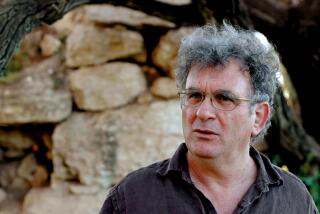TERRORISM / A NAME FROM THE PAST : A Nasser on Trial in Egypt
- Share via
CAIRO — They struck four times, usually in the summer. On one occasion, an Israeli security officer was killed, as he drove from his home in the fashionable suburb of Maadi, by gunmen who sprayed automatic gunfire into his car, wounding his wife and an embassy secretary. On another, four Israelis were shot at the International Fairgrounds, one of them fatally.
The last attack occurred on May 26, 1987, when gunmen opened fire on a car carrying the chief of security for the U.S. Embassy and two of his deputies. They sped away with a few scratches. A mysterious organization calling itself Egypt’s Revolution said the intention of that attack was to send “Reagan’s despised CIA agents to where we sent their Israeli henchmen before them--to hell.”
As it turned out, the attackers were not members of a Palestinian terrorist cell or an extremist Muslim group, the sort whose communiques have become chillingly familiar in a region often ruled by sudden violence.
Egyptian investigators soon began to realize that Egypt’s Revolution was a home-grown terrorist organization that included senior army officers, current and retired. One of its leaders, prosecutors say, was the eldest son of Egypt’s legendary former president, Gamal Abdel Nasser.
Khalid Abdel Nasser returned voluntarily to Egypt last month to face trial after years in exile in Yugoslavia, propelling the case into the headlines again. It also reminded President Hosni Mubarak’s government of the enduring popularity of the man who threw off British imperialism, made Egypt the patron of the Arab world, nationalized the vast holdings of Egypt’s elite and stubbornly battled, until his untimely death in 1970 at the age of 52, against Israeli attempts to gain new footholds in Arab territory.
Analysts say Khalid Abdel Nasser’s return couldn’t have come at a worse time for Mubarak, who is facing increasing public dissent over rising food and gas prices and a deadlocked peace process with Israel.
“Camp David,” a Western diplomat said, “is perhaps less accepted than it has ever been before; the peace process is at a halt; the rule of the government is less than it has ever been. If you’re going to choose a time to come and cause discord, it’s not a bad time to choose.”
Mubarak’s government faces intense pressure from Washington to prosecute the case, along with corresponding pressure from Arab hard-liners to go easy on the son of a national hero. Prosecutors have publicly sought the death penalty for Nasser and 10 of the 20 other defendants.
“How can we execute the son of Gamal Abdel Nasser for killing Israelis, our enemies?” asked Khalid Mohieddin, who helped Nasser plot the 1952 revolution. Mohieddin, for whom Khalid Abdel Nasser was named, now heads a leftist coalition that includes the modern-day Nasserites.
“There is peace between Israel and Egypt,” said Mohieddin, who also heads a committee of Arab politicians and intellectuals for the defense of the revolution. “The government signed a treaty. But the majority of the Egyptian people consider Israel as the first enemy.”
Defense attorneys have challenged the confessions by several of the defendants, arguing that they were obtained under torture.
But the defense is also arguing that even if the allegations are true, the attacks did not constitute a crime. Egypt’s 1979 peace treaty, they argue, was illegal because Egypt, as part of the “Arab nation,” had no authority to make a separate peace with Israel and remains, therefore, at war.
In court, Prosecutor Ragaa Arabi scoffed at the defense, saying: “There is no glory in assassinating women and diplomats on Egyptian soil. The true heroic deed is the Palestinian intifada , the struggle of an entire people against occupation (by Israel).”
Arabi described the defendants as “inhuman, depraved criminals who wanted to portray themselves as nationalist heroes.” Of Nasser’s son, he said: “To desire fame and power is his right as a citizen. However, Khalid took the path of crime to realize his goals, and for this he must be penalized, regardless of who his father was.”
More to Read
Sign up for Essential California
The most important California stories and recommendations in your inbox every morning.
You may occasionally receive promotional content from the Los Angeles Times.













